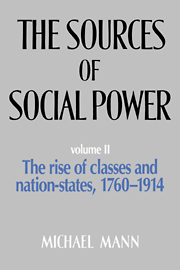Book contents
- Frontmatter
- Contents
- Preface
- 1 Introduction
- 2 Economic and ideological power relations
- 3 A theory of the modern state
- 4 The Industrial Revolution and old regime liberalism in Britain, 1760–1880
- 5 The American Revolution and the institutionalization of confederal capitalist liberalism
- 6 The French Revolution and the bourgeois nation
- 7 Conclusion to Chapters 4–6: The emergence of classes and nations
- 8 Geopolitics and international capitalism
- 9 Struggle over Germany: I. Prussia and authoritarian national capitalism
- 10 Struggle over Germany: II. Austria and confederal representation
- 11 The rise of the modern state: I. Quantitative data
- 12 The rise of the modern state: II. The autonomy of military power
- 13 The rise of the modern state: III. Bureaucratization
- 14 The rise of the modern state: IV. The expansion of civilian scope
- 15 The resistible rise of the British working class, 1815–1880
- 16 The middle-class nation
- 17 Class struggle in the Second Industrial Revolution, 1880–1914: I. Great Britain
- 18 Class struggle in the Second Industrial Revolution, 1880–1914: II. Comparative analysis of working-class movements
- 19 Class struggle in the Second Industrial Revolution, 1880–1914: III. The peasantry
- 20 Theoretical conclusions: Classes, states, nations, and the sources of social power
- 21 Empirical culmination – over the top: Geopolitics, class struggle, and World War I
- Appendix: Additional tables on state finances and state employment
- Index
2 - Economic and ideological power relations
Published online by Cambridge University Press: 04 August 2010
- Frontmatter
- Contents
- Preface
- 1 Introduction
- 2 Economic and ideological power relations
- 3 A theory of the modern state
- 4 The Industrial Revolution and old regime liberalism in Britain, 1760–1880
- 5 The American Revolution and the institutionalization of confederal capitalist liberalism
- 6 The French Revolution and the bourgeois nation
- 7 Conclusion to Chapters 4–6: The emergence of classes and nations
- 8 Geopolitics and international capitalism
- 9 Struggle over Germany: I. Prussia and authoritarian national capitalism
- 10 Struggle over Germany: II. Austria and confederal representation
- 11 The rise of the modern state: I. Quantitative data
- 12 The rise of the modern state: II. The autonomy of military power
- 13 The rise of the modern state: III. Bureaucratization
- 14 The rise of the modern state: IV. The expansion of civilian scope
- 15 The resistible rise of the British working class, 1815–1880
- 16 The middle-class nation
- 17 Class struggle in the Second Industrial Revolution, 1880–1914: I. Great Britain
- 18 Class struggle in the Second Industrial Revolution, 1880–1914: II. Comparative analysis of working-class movements
- 19 Class struggle in the Second Industrial Revolution, 1880–1914: III. The peasantry
- 20 Theoretical conclusions: Classes, states, nations, and the sources of social power
- 21 Empirical culmination – over the top: Geopolitics, class struggle, and World War I
- Appendix: Additional tables on state finances and state employment
- Index
Summary
It became conventional in the eighteenth century – and it has remained so ever since – to distinguish between two fundamental spheres of social activity – “civil society” (or just “society”) and “the state.” The titles of this chapter and the next would seem to conform to that convention. Though Smith, other political economists, and Marx meant by “civil society” only economic institutions, others – notably, Ferguson, Paine, Hegel, and Tocqueville – believed it comprised the two spheres discussed in this chapter. For them, civil society meant (1) decentered economic markets resting on private property and (2) “forms of civil association … scientific and literary circles, schools, publishers, inns, … religious organizations, municipal associations and independent households” (Keane 1988: 61). These two spheres carried vital decentered and diffused freedoms that they wished secured against the authoritative powers of states.
Yet, such a clear division between society and state carries dangers. It is, paradoxically, highly political, locating freedom and morality in society, not the state (obviously Hegel differed in this respect). This was so among the eighteenth-century writers resisting what they saw as despotism, and it has recently been so again as Soviet, East European, and Chinese dissidents sought to mobilize decentralized civil society forces against state repression. Yet states are not as distinct from the rest of social life as these ideologies suggest. Volume I showed that civil societies had first risen entwined with modern states.
- Type
- Chapter
- Information
- The Sources of Social Power , pp. 23 - 43Publisher: Cambridge University PressPrint publication year: 1993



